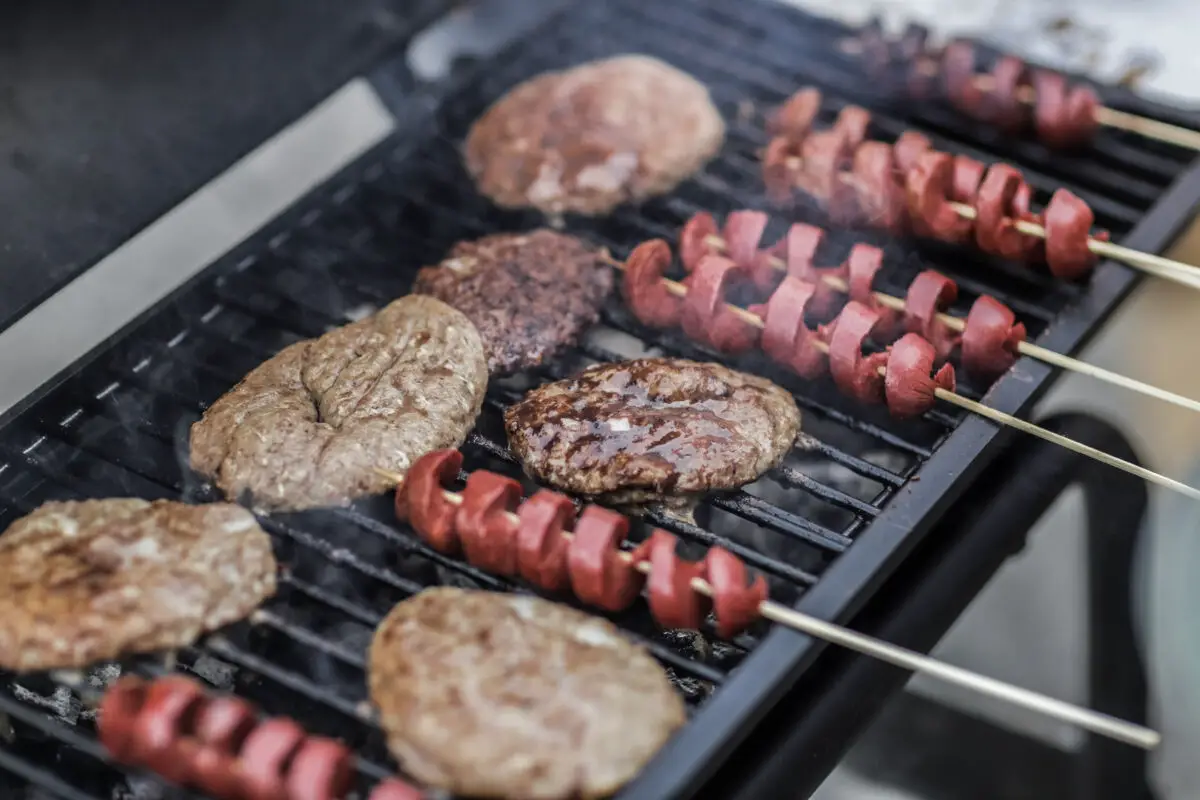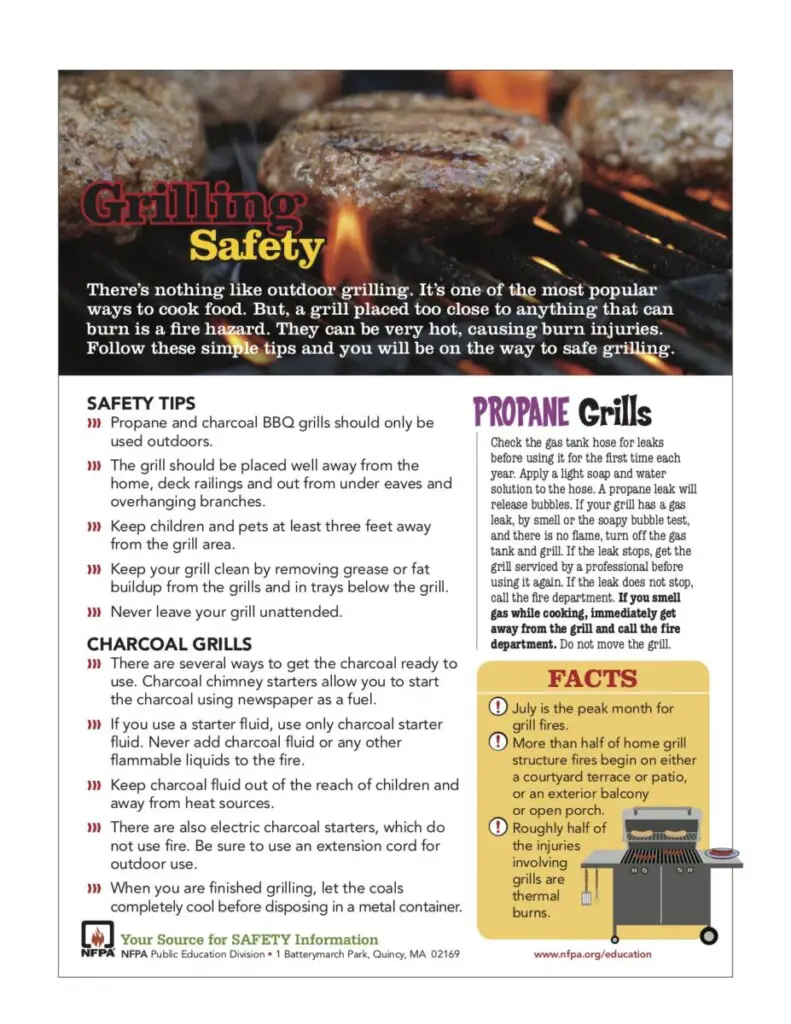Now that summer is here, I started to wonder if I could have a small grill out on my balcony. It seemed like a really convenient and fun idea, but I knew that having an open flame so close to my home could be hazardous.
Many states in the US have adopted the International Fire Code. This code prohibits the use of grills on combustible balconies, which includes most apartment and condominium balconies.
I decided to compile up all the information I found for each state in hopes that it might be helpful to others. Keep in mind that I’m not a lawyer and this is not legal advice. It’s just some basic guidelines and sources that I found online.
This information can become outdated and inaccurate over time, so it’s important to do your own research and contact local authorities to be sure.
What Is a Combustible Balcony?
A combustible balcony is one that is constructed from highly flammable materials such as wood, composite, and vinyl. These materials may be used to construct the balcony floor, railing, or the adjacent wall.
Here’s a great YouTube video to show you how quickly a balcony can burn depending on what kind of materials it was made from:
What Is Considered an Open-Flame Grill?
- A gas grill is considered an open-flame grill. It has a visible flame that is used to cook food.
- Charcoal grills are usually not considered open-flame grills, because food is cooked over heated coals, and not a fire. Although a fire can be used to start a charcoal grill, the flame quickly diminishes once the coals are heated. As an alternative, electric starters can be used to ignite coals without an open flame.
- Wood or pellet grills and smokers are considered open flame. There is a potential for hot embers to fall from the fire box and onto a combustible surface such as a balcony.
How Far Should a Grill Be From the House?
A grill should be placed at least 10 feet away from siding, railing, and over eaves of a house or garage. A grill should never be used in a house or garage due to the risk of carbon monoxide poisoning or causing a fire.
Can You Grill on a Balcony in Your State?
Most states in the US have adopted the International Fire Code. Generally, grills are not permitted for use on balconies under this code, but some states have made amendments and exceptions.
If you’re unsure of whether or not you can use a grill on your balcony, you can check with your landlord, leasing company, or local fire department.
Alabama
The Alabama fire code prohibits the use of a grill on an apartment balcony unless it has an automatic sprinkler system. Charcoal grills and other open-flame cooking devices can’t be used on combustible balconies or within 10 feet of combustible construction. (Source)
Alaska
Alaska adopted the 2009 International Fire Code and doesn’t permit the use of certain grills on balconies. Charcoal burners and other open-flame devices can’t be used anywhere within 10 feet of combustible construction such as a nearby wall or railing. However, electric grills are acceptable. (Source)
Arizona
Arizona adopted the 2018 International Fire Code and allows the use of electric grills on balconies. Charcoal grills and other open-flame devices can’t be operated on combustible balconies or within 10 feet (3048mm) of combustible construction. (Source)
Arkansas
The Arkansas Fire Prevention Code prohibits the use of charcoal and gas grills on apartment balconies. (Source)
California
The Fire Code adopted in California prohibits the use of charcoal burners and other open-flame cooking devices on balconies. Grills must not be used within 10 feet of combustible construction. (Source)
Colorado
Denver’s Fire Code is based on the International Fire Code, but consists of specific Denver Amendments. People can barbecue with a 1 pound cylinder of propane and have one extra 1 pound bottle on hand. However, charcoal barbecues are not permitted on any building balconies. (Source)
Connecticut
In Connecticut, the National Fire Protection Association’s fire code prohibits the use of grills or other heating devices on balconies. The code exempts detached one- and two-family dwellings, and certain townhouses. (Source)
Delaware
Under the Delaware State Fire Prevention Regulations, no hibachi, grill, or other similar devices used for cooking may be used on a balcony. The devices also cannot be stored on a balcony. (Source)
Florida
The Florida Fire Prevention Code prohibits any cooking on an apartment or condominium balcony that isn’t part of one- or two-family dwellings. Electric grills are allowed. (Source)
Georgia
Most cities in Georgia have adopted the International Fire Code, which prohibits grilling within 10 feet of an apartment building. The only exception is if there is an automatic sprinkling system installed on the balcony. (Source)
Hawaii
In Hawaii, except in one- or two-family dwellings, no hibachi, grill, or other similar devices used for cooking may be used on a balcony. (Source)
Idaho
Idaho has adopted the 2015 International Fire Code which prohibits the use of charcoal and gas grills and other open burning devices on combustible balconies or within 10 feet of combustible construction. There are exceptions for certain homes and where buildings, balconies and decks are protected by an automatic sprinkler system. (Source)
Illinois
In Illinois, grilling is permitted on non-combustible balconies, provided that it’s okay with landlords, condominium boards, and home associations. No grills or other cooking devices shall be operated or located on combustible balconies. (Source)
Indiana
In Indiana, a grill can’t be used on a balcony if the building exterior or the balcony is composed of combustible materials. The grill can’t be used or stored within 10 feet of combustible construction. There are exceptions for one- and two-family dwellings and balconies that are protected by an automatic sprinkler system. (Source)
Iowa
In Iowa, charcoal grills or similar type grills are not allowed on balconies. Gas grills that use no more than 1 twenty pound propane cylinder are permitted. 1 and 2 family dwellings are an exception, but it is recommended that grills be used at least 10 feet away from any structure or combustible material. (Source)
Kansas
Kansas has adopted the International Fire Code, which prohibits the use of charcoal burners and other open-flame cooking devices on combustible balconies or within 10 feet (3048mm) of combustible construction. There are exceptions for one- and two-family dwellings, and balconies that have an automatic sprinkler system. (Source)
Kentucky
In Kentucky, grills are not allowed if they’re within 10 feet of any structure, which rules out most balconies. This applies to all grill types. (Source)
Louisiana
In Louisiana, grills should be kept off of a balcony, and placed well away from the home, deck railings, and out from under eaves and overhanging branches. (Source)
Maine
In Maine, no gas/charcoal grills and or cooking stoves of any kind are permitted on balconies. (Source)
Maryland
In Maryland, you cannot use a charcoal or gas grill on a balcony or any area within 15 feet of a condominium or apartment building that has 3 or more living units. You can use an electric grill or similar appliance if no open flame is produced. (Source)
Massachusetts
In Massachusetts, grills must be 10 feet away from the side of a building, and can’t be used on a balcony with a roof, overhang, or wall (other than the exterior of the building). (Source)
Michigan
In Michigan, grills should never be used on a balcony. Grills should be placed on a level surface at least 10 feet away from any structure. (Source)
Minnesota
In Minnesota, open-flame grills are prohibited on balconies of any structure containing three or more dwelling units. Open flames are not permitted within 15 feet of a structure. There are exceptions for electric or gas-fired barbecue grills that are approved by the fire chief. (Source)
Mississippi
In Mississippi, propane and charcoal grills should be placed well away from the home and not on balcony or deck railings. (Source)
Missouri
In Missouri, grills should not be used on balconies. Grills should be positioned away from siding, railings, and out from under eaves and overhanging branches. (Source)
Montana
Montana has adopted the 2012 International Fire Code which prohibits the use of charcoal burners and other open-flame cooking devices on combustible balconies or within 10 feet of combustible construction. (Source)
Nebraska
In Nebraska, gas-fired, hibachi and similar grills operated on balconies or under any overhang are not permitted. Electric grills are an exception. (Source)
Nevada
In Nevada, grills should be kept off balconies and well away from siding, deck railings, and out from under eaves and branches. (Source)
New Hampshire
In New Hampshire, grills are not permitted on most apartment balconies. For other than one- and two-family dwellings, no hibachi, grill, or other similar devices used for cooking, heating, or any other purpose, shall be used or kindled on a balcony or within 10 feet of any structure. (Source)
New Jersey
In New Jersey, LP-gas barbecue grills are not permitted on balconies. Charcoal grills and other open-flame cooking devices shall not be used or stored on combustible balconies. There are exceptions for detached one and two-family dwellings and where the balconies are protected by an automatic sprinkler system. (Source)
New Mexico
In New Mexico, grills shall not be used on combustible balconies or within 10 feet of combustible surface. (Source)
New York
In New York, a grill must be at least 10 feet away from anything that could catch fire. Electric barbecues are allowed for use on balconies. Propane gas and charcoal barbecue grills are generally not allowed. For a one- or two-family home, a propane grill is permitted if there are no more than two 20-pound LPG tanks on the property. (Source)
North Dakota
In North Dakota, the basic rule is that charcoal burners and other open-flame cooking devices can’t be operated on combustible balconies or within 10 feet of combustible construction. (Source)
North Carolina
In North Carolina, if the balcony is made of combustible materials, or if the placement of the grill is such that it will be located within 10 feet of any combustible construction, then grilling is prohibited. This does not apply to electric grills. (Source)
Ohio
In Ohio, charcoal burners and other open-flame cooking devices shall not be operated on combustible balconies or within 10 feet of combustible construction.” Open-flame cooking includes gas grills and fire pits. Combustible construction includes the vast majority of homes and decks. (Source)
Oklahoma
In Oklahoma, electric or open-flame cooking appliances, including charcoal, electric or gas grills, on combustible, outdoor balconies or outdoors within 10 feet of any combustible portion of any residential multiple-family dwelling (apartments with more than two dwelling units) is not permitted. (Source)
Oregon
In Oregon, charcoal and open-flame grills should not be used on balconies or within 25 feet of a structure. (Source)
Pennsylvania
In Pennsylvania, grills should be at least 15 feet away from any structure and at least three feet away from any combustible materials. Grills should not be used on a balcony. (Source)
Rhode Island
In Rhode Island, grills should be placed well away from the home, deck railings and out from under eaves and overhanging branches. Grills should not be used on balconies. (Source)
South Carolina
In South Carolina, propane and charcoal grills should be placed well away from the home and not used on balconies. (Source)
South Dakota
No information.
Tennessee
In Tennessee, propane and charcoal grills should only be used outdoors and away from the home. Grills should not be used near anything combustible, including balconies. (Source)
Texas
In Texas, the International Fire Code requires 10 feet of clearance between open flame cooking appliances and combustible surfaces or structures in multi-family occupancies that don’t have an automatic sprinkler system. Most apartment patios and balconies do not permit the required clearance. Management may prohibit any open flame appliances as part of your lease agreement. (Source)
Utah
In Utah, charcoal burners and other open-flame cooking devices shall not be operated on combustible balconies or within 10 feet of combustible construction. There are exceptions for one- and two-family dwellings and where balconies are protected by an automatic sprinkler system. (Source)
Vermont
In Vermont, hibachi, gas-fired grills, charcoal grills, or other similar devices used for cooking, healing, or any other purpose, shall not be used or kindled on a balcony. There are exceptions for one- and two-family dwellings. (Source)
Virginia
In Virginia, no charcoal cooker, brazier, hibachi or grill or any gasoline or other flammable liquid or liquefied petroleum gas-fired stove or similar device shall be ignited or used on the balconies or within 15 feet of any apartment building or other structures with similar occupancy. (Source)
Washington
In Washington, charcoal burner grills and other open-flame cooking devices shall not be operated on combustible balconies or within 10 feet of combustible construction. Exceptions include one and two-family dwellings and buildings, balconies and decks that are protection by an automatic sprinkler system. (Source)
West Virginia
In West Virginia, propane and charcoal BBQ grills should only be used outdoors and placed well away from the home. Grills should not be used on a balcony. (Source)
Wisconsin
In Wisconsin, grills cannot be used within 10 feet of combustible balconies or combustible construction. There are exceptions for one- to two-family homes. Grills may be used on a balcony protected by automatic sprinklers. (Source)
Wyoming
In Wyoming, the International Fire Code requires 10 feet of clearance between open flame cooking appliances and combustible surfaces or structures in multi-family occupancies that don’t have an automatic sprinkler system. (Source)


